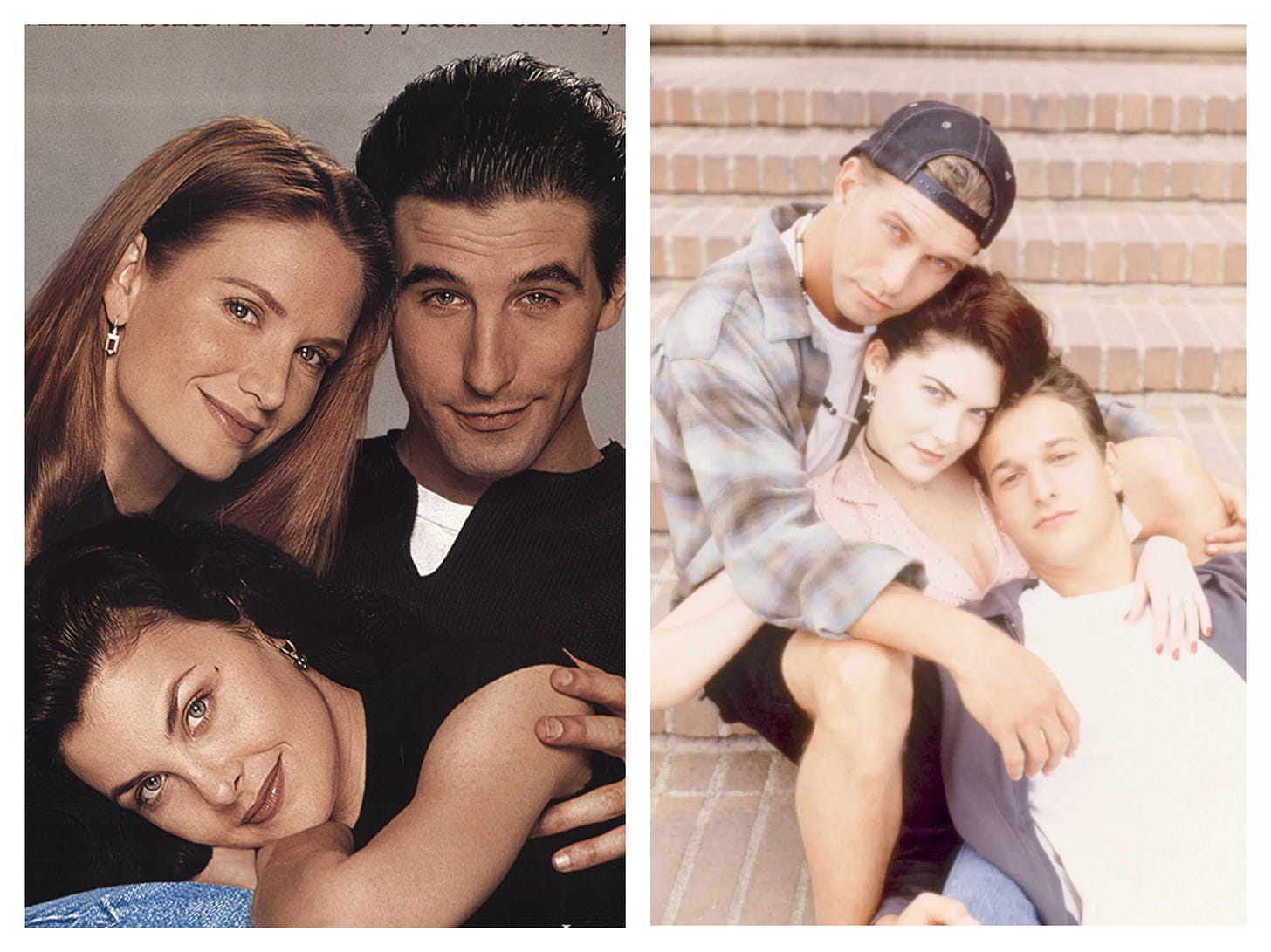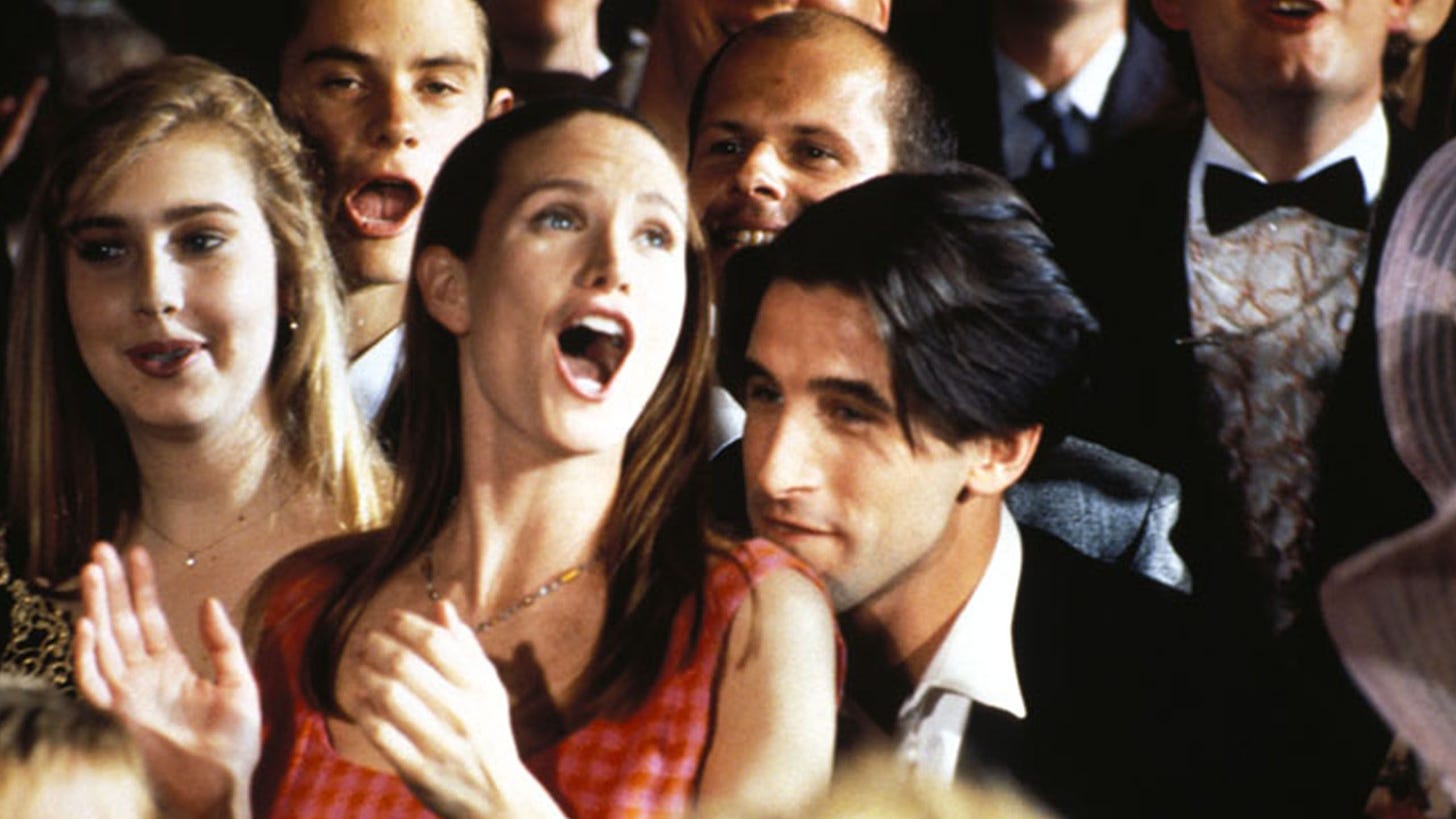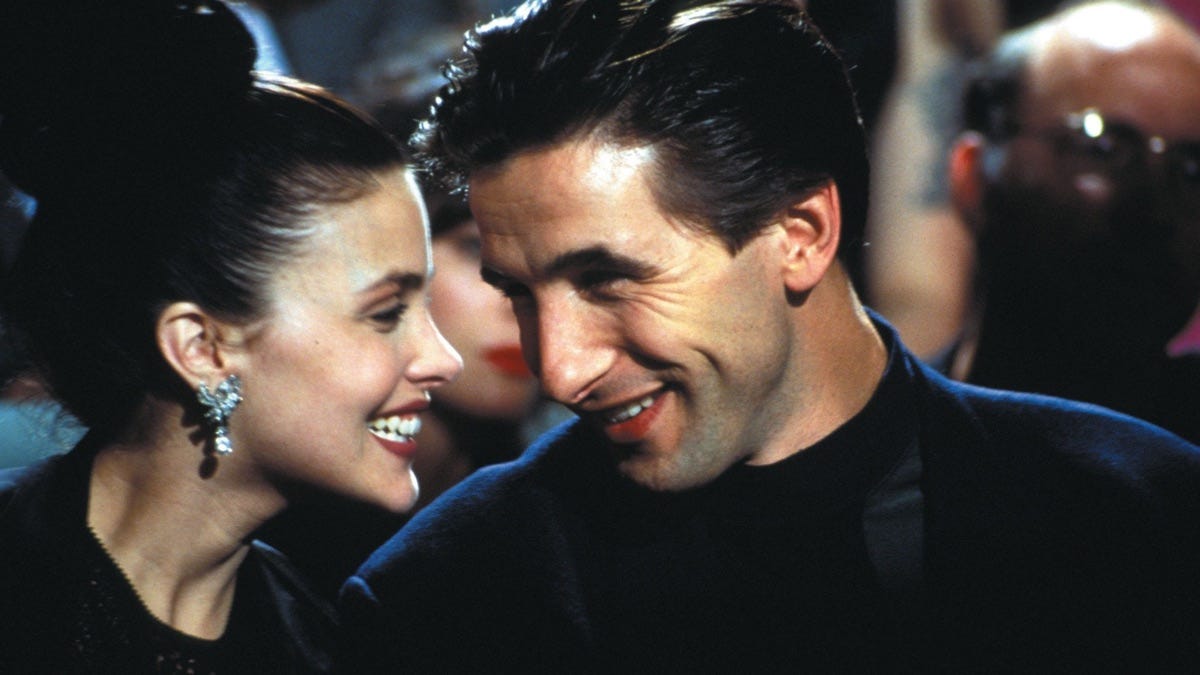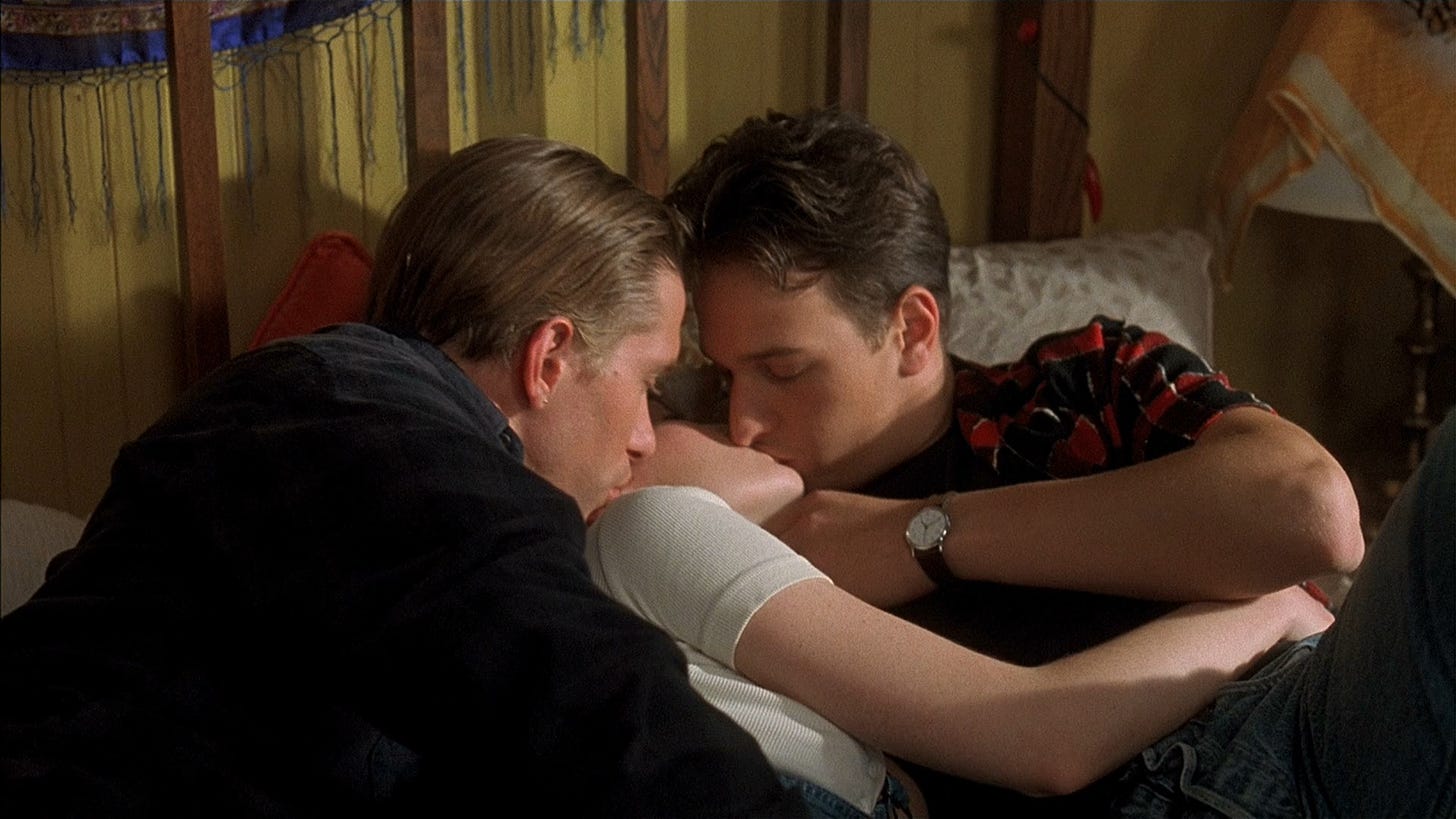Josh & Stephen & Lara & Sherilyn & Kelly & Billy
Remembering a brief moment in the early ’90s that produced two films about sexually fluid love triangles starring Baldwin brothers and Twin Peaks cast members.
Every once in a while—though not so much anymore—competing films built around extremely similar ideas arrive in theaters around the same time that make comparisons between the two unavoidable. Deep Impact vs. Armageddon. Antz vs. A Bug’s Life. Capote vs. Infamous. Barbie vs. Oppenheimer. (OK, maybe not that last one.) But few such match-ups have been so niche and specific in their similarities as two films that bracketed the stretch between April 1993 and April 1994.
For whatever reason—the shifting of sexual mores, the whims of casting directors, the alignment of the cosmos–theaters saw not one but two films concerning love triangles whose three members fell on different spots on the Kinsey Scale. But the similarities didn’t end there. Both featured similar titles, creating a “Which one did I watch again?” situation that anticipated the Mimic-or-Relic confusion of a few years later. Both featured then-ascendant members of the Baldwin family. And both featured cast members of Twin Peaks, which was still being mined for young talent, even though it was canceled due to collapsing ratings a few years earlier.
I was put in mind of these films after watching Challengers, which uses the sexual ambiguity enveloping its three protagonists’ relationship as a central element without ever feeling like the taboos that ambiguity butts up against are the only reason the movie exists. Put another way, a version of Challengers released in the early ’90s would have been treated as "The movie about the tennis players where the guys kiss and might want to sleep with each other” first, with every other element of the film taking a back seat. Even a perceived lack of novelty was treated as novel. “Now everyone can breathe easy,” Stephen F. Vletas wrote in the opening of his positive review of Three of Hearts for the Jackson Hole News. “There is finally a film that treats gays (lesbians) as normal people.” (The weird parenthetical in belongs to Vletas, not me.)
The first of the two films to arrive in theaters, and the more conventional, Three of Hearts stars Kelly Lynch as Connie, a New York doctor who takes her film-opening break-up with her English professor girlfriend Ellen (Sherilyn Fenn) poorly. And understandably so. Connie had thought they were in a serious relationship, even making plans to come out to her expansive Polish-American family at her sister’s wedding. (Which seems a little ill-timed and selfish given that’s not her day, but that doesn’t make her disappointment less real.) What’s more, Ellen doesn’t seem to know for sure if she wants to be exclusively with women, much less only Connie.
To avoid going stag, Connie hires a male escort named Joe (William Baldwin) to serve as her wedding date. There he charms everyone in sight, including Connie who, after learning that Joe’s apartment has been trashed by thugs working for a tough guy to whom he owes money, takes pity on him and lets him move into her apartment. Then, after Joe suggests Ellen will come running back to her after a man breaks her heart, Ellen hits upon a scheme: What if she hired Joe to do the heartbreaking to speed up the process?
So Joe begins auditing Ellen’s fuzzily themed class, where the homework includes writing love letters. Caught plagiarizing a poem fed to him by Connie, Joe then invents a hard-luck story about his tough upbringing until Ellen’s heart starts to melt. It’s just the sort of morally dubious scheme that’s fueled romantic comedies since the invention of the form and Three of Hearts is as incurious about exploring the squeakiness of the scheme as any of its forbears, though Lynch gives a harsh edge to Connie’s joking (?) habit of calling Ellen a “bitch” and “slut” when Joe reports back on his progress.
“The lesbian angle in Three of Hearts is just a rejiggering of the usual romantic-triangle formula,” Peter Rainer wrote in his Los Angeles Times review. “It’s a refreshing variant until you realize that nothing is going to come of it.” And that’s mostly true, but the best moments of the Yurek Bogayevicz-directed, Mitch Glazer- and Adam Greenman-scripted film are those when it forgets the formula to which it’s bound and focuses on the relationship between Joe and Connie, as when Connie takes Joe to a lesbian bar where he gets a crash course on famous closeted gay men and women, and Joe tells Connie about the tricks of the gigolo trade. (“Make them feel like they’re the hottest, most beautiful woman in the world.”)
Apart from, well, looking like Sherilyn Fenn, Ellen seems like a drip compared to the new pals and, refreshingly, the film never suggests that Connie might “turn straight” and fall for Joe, even after Ellen makes the obvious correct decision of getting as far away as possible from both of them at movie’s end. If only it were a little better. Though Joe Pantoliano has some memorable moments as Joe’s “agent,” as when tells his star employee, with a mix of admiration and menace, “I polished you like a diamond so you could sparkle for all those rich bitches on Park Avenue,” Three of Hearts ultimately plays like just another ’90s rom-com, albeit one with a twist that’s not much of a twist at all.
That might explain why it met such commercial indifference. Three of Hearts debuted in a box office dominated by Indecent Proposal (a far more morally dubious love triangle story), but its seventh-place showing put it behind Wh0’s the Man? in its second week (though well ahead of Cop and a Half in its seventh). A year later, Threesome fared little better. This was in spite of a title that created a promise on which the movie would seemingly have to deliver and a teasing ad campaign built around the tagline, “One girl. Two guys. Three possibilities.” Or, as the smirky TV spot put it, “1 Girl, 2 Guys, The Possibilities… Are Endless.”
Yet the point of the movie often seems to be that the possibilities are less limited than conventional morality yet but not exactly limitless, either. Written and directed by Andrew Fleming (later to helm The Craft, Dick, and other fondly remembered films), Threesome stars Josh Charles as Eddy, a junior-year transfer student who moves into his new college’s dorm where he’s paired with Stuart (Stephen Baldwin). A slovenly jock, Stuart’s an Oscar Madison to Eddy’s neat and thoughtful Felix Unger, but they become fast friends anyway. Then a third roommate joins them: Alex (Lara Flynn Boyle), a drama major mistakenly assigned to their suite because of her first name. In short order, Alex falls for Eddy, Stuart falls for Alex, and Eddy’s attraction to Stuart makes him realize his self-described “sexual ambivalence” might not be that ambivalent after all.
Fleming has discussed drawing from his own college experiences for the film, which might explain why it vacillates wildly between moments of broad comedy, as when Alex stretches out on a library table and brings herself to climax by listening to Eddy read (“I love big words!”), and a genuine sense of messiness. After recognizing their odd situation, Alex, Eddy, and Stuart vow not to sleep with one another while remaining close friends. But the close friendship turns into an extended act of edging. They sleep in the same bed, fondle each other in public, and otherwise merge into a powerfully charged closed circuit of three, becoming the talk of the dorm in the process. Perhaps realizing that college is somewhere between childhood play and the expectations of what used to be called “the straight world,” they decide to burrow into an unconventional situation for as long as they can.
Then the tension comes to a head. After a skinny dipping session that turns unusually handsy, even for the three pals, Stuart sleeps with Alex. Then Eddy sleeps with Alex. Then, as promised, there’s a threesome, which is explicit enough that what it doesn’t show is just as conspicuous as what it does. Alex stays between the two men, though Eddy is permitted to touch Stuart’s naked hip. It’s an uneven triangle, with lots of kissing but with a Lara Flynn Boyle-shaped buffer between the male partners. It’s daring in its way, but there’s one line Threesome seemingly can’t cross. That Baldwin’s character is the least-developed of the three (and his performance the weakest, with even the usually detached Boyle showing some depth and emotion) doesn’t help. Eddy and Alex feel like real people. Stuart is just a big, backwards baseball cap-wearing sex goober.
That might help explain why it feels only mildly provocative, opening some doors while keeping others shut or, at most, cracked. In a recent piece for Queerty, Jorge Molina described it as “Bi-Erasure: The Movie,” praising the film for depicting sexuality as a process of discovery but noting that it’s “terribly stuck in its time” and “straight up rejects the notion that bisexuality could ever be possible.” This sets it apart from Three of Hearts, where Ellen is decidedly bisexual, but both feel kind of quaint. They play like well-meaning remnants of a transitional time when a mainstream film with queer characters was a novelty and where queerness could often feel like a film’s raison d’etre, rather than one element in, say, a superheated tennis movie whose characters all seemingly want to sleep with each other at any given moment.
But let’s get to what really matters: In the clash between these films, who wins?
Better Baldwin: Three of Hearts. Both films come from an era in which both William and Stephen seemed capable of challenging Alec for Baldwin dominance, but Willam’s the clear winner here. He’s handsome and convincingly charming, as the opening phone sex scene makes clear.
Better Use of a Twin Peaks Alum: Threesome. Three of Hearts styles Fenn like the classic movie star she resembles but doesn’t give her much to play. Boyle gets to act in Threesome. Though sometimes that means overacting, it’s still the more memorable performance.
Better Throuple: Threesome, though that’s not really a fair fight. The three leads of Three of Hearts barely have any scenes together and never come close to crawling into bed together.
Better Soundtrack: Eh… This is tough. Three of Hearts makes good use of Sting’s “Shape of My Heart,” one of the better singles from his “I guess I make adult contemporary music now” period. Threesome technically has the better soundtrack, one that includes Teenage Fanclub’s take on “Like a Virgin,” a smoldering Bryan Ferry song, and U2’s Patti Smith cover “Dancing Barefoot.” But it loses points for including New Order’s “Bizarre Love Triangle,” a great song but a thuddingly obvious selection. Call it a draw.
Sexier: Threesome, but Three of Hearts doesn’t really try to be erotic apart from one perfunctory, Sting-accompanied scene.
Winner: Threesome. It’s not a great movie, but it’s an earnestly messy effort and a pretty good time capsule of sexual exploration in the age of flannel shirts.









Back when I was a projectionist at the University of Georgia's on-campus theater, I remember vividly a preview screening we held for THREESOME and the collective "uuuuuugggggh" response to the two men completing the love triangle. Lara Flynn Boyle was definitely a crucial "buffer" for an audience that, theoretically, should have been more forward-thinking than the average crowd. It's a good sign of where we're at as a culture that a studio can spend $50 million on CHALLENGERS, which is far more brazen in its bisexuality, and not have to worry quite so much about recoil.
"Sexual Exploration in the Age of Flannel Shirts" needs to be the title of a really niche history book.